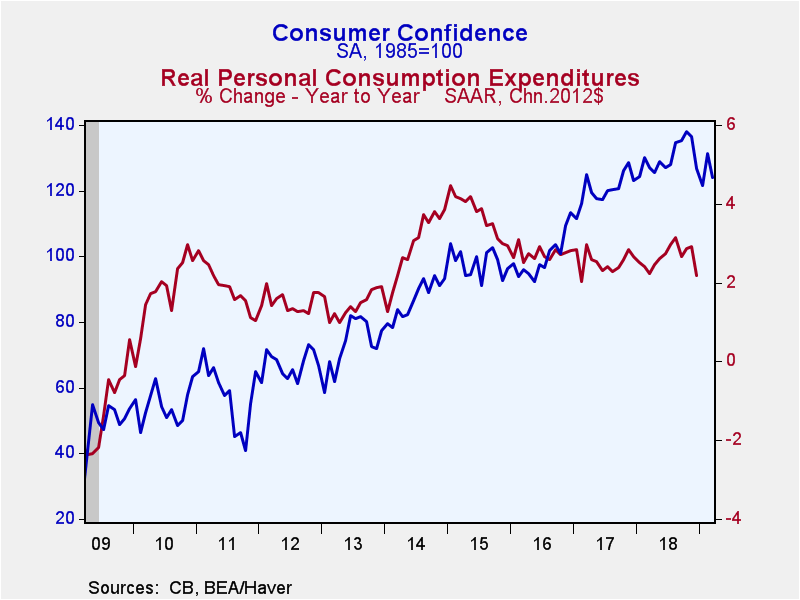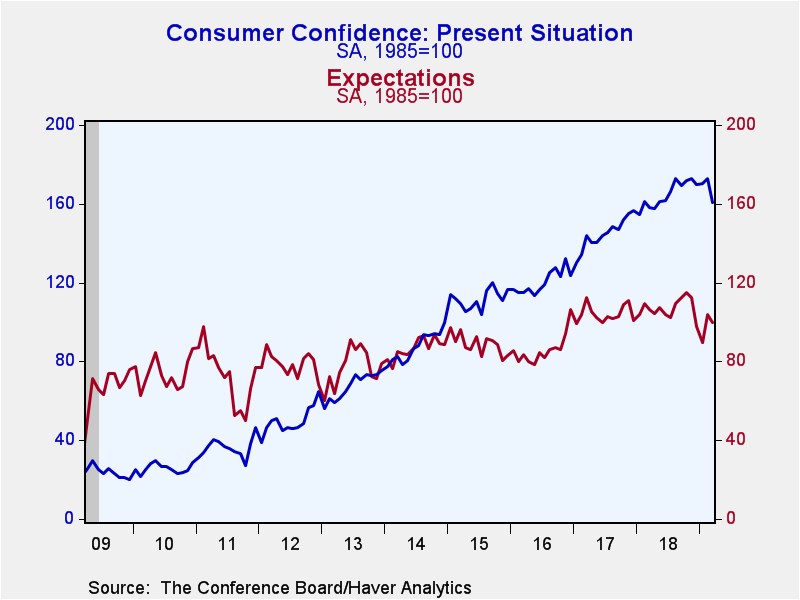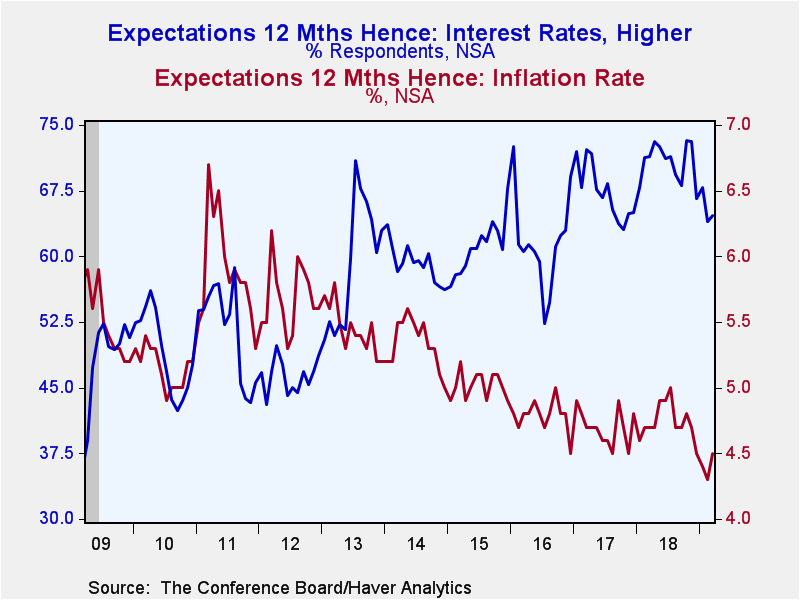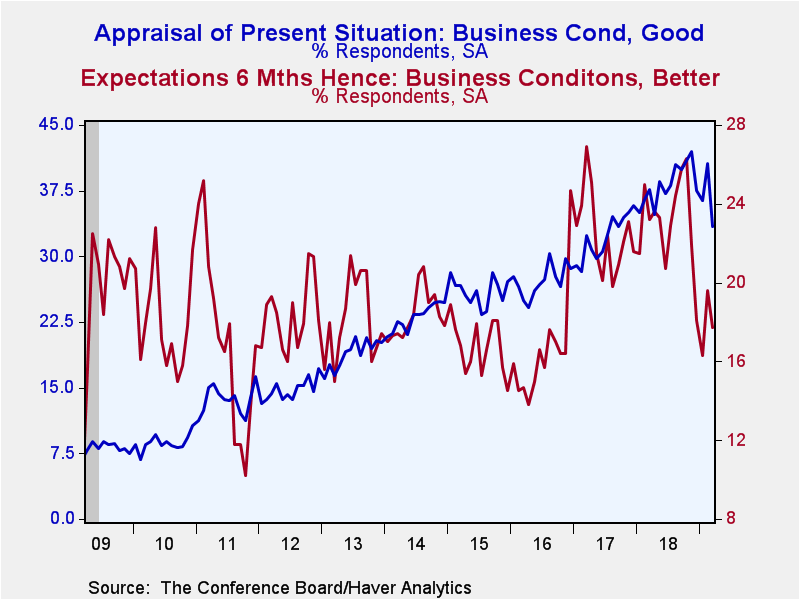 Global| Mar 26 2019
Global| Mar 26 2019U.S. Consumer Confidence Weakens Broadly
by:Tom Moeller
|in:Economy in Brief
Summary
The consumer has become wary about the current and future economic environment. The Conference Board Consumer Confidence Index declined 5.6% (-2.3% y/y) to 124.1 during March and reversed most of February's increase. The decline left [...]
The consumer has become wary about the current and future economic environment. The Conference Board Consumer Confidence Index declined 5.6% (-2.3% y/y) to 124.1 during March and reversed most of February's increase. The decline left confidence 10.0% below the cycle high reached last October. The m/m decline surprised expectations in the Action Economics Forecast Survey which were for a slight rise to 132.3. During the past ten years, there has been a 61% correlation between the level of consumer confidence and the year-on-year change in monthly real consumer spending.
The decline in confidence overall reflected a diminished perspective of the current & future state of affairs. The reading of the present situation declined 7.1% (+1.6% y/y) to 160.6, the lowest level since last April. The expectations reading declined 3.9% (-6.0% y/y) to 99.8 after a 16.1% jump in February, and was 13.3% below the cycle peak reached in October.
The percentage of respondents who believed that business conditions were good dropped sharply to 33.4% from a high of 42.0% last November. The percentage of respondents who believed jobs were plentiful fell to 42.0%, the lowest percentage in nine months. Jobs were viewed as hard to get by an increased 13.7%, up from the cycle low of 11.7% reached in February.
On the expectations front, a greatly lessened 17.7% of respondents felt that business condition would improve. A fewer 16.4% thought that there would be more jobs, down from 22.7% in November, though an improved 21.0% felt that income would increase. That percentage remained nevertheless below the 25.4% who thought in August that income would increase.
A slightly higher 4.5% of respondents thought that inflation would rise, though that remained below the 5.0% who thought so in July. The 64.7% who felt that interest rates would rise was below the 73.2% October high.
The 0.8% of respondents who planned to buy a new home was half this cycle's high registered in July 2017 and matched the least since September 2016. Plans to buy a major appliance remained low.
By age group, lessened confidence was widespread, but most pronounced amongst younger individuals. For those who were under age 35, the confidence reading declined 12.3% this month and mostly reversed the February gain. The reading was at the low end of its range since the beginning of last year. Confidence in the 35-54 year old age bracket fell sharply to the lowest level since June 2017, off 14.9% from the peak last October. Confidence amongst individuals over age 55 eased slightly m/m, but was 7.0% below the October peak.
The Consumer Confidence data are available in Haver's CBDB database. The total indexes, which are indexed to 1985=100, appear in USECON, and the market expectations are in AS1REPNA.
| Conference Board (SA, 1985=100) | Mar | Feb | Jan | Mar Y/Y % | 2018 | 2017 | 2016 |
|---|---|---|---|---|---|---|---|
| Consumer Confidence Index | 124.1 | 131.4 | 121.7 | -2.3 | 130.1 | 120.5 | 99.8 |
| Present Situation | 160.6 | 172.8 | 170.2 | 1.6 | 164.8 | 144.8 | 120.3 |
| Expectations | 99.8 | 103.8 | 89.4 | -6.0 | 107.0 | 104.3 | 86.1 |
| Consumer Confidence By Age Group | |||||||
| Under 35 Years | 127.5 | 145.3 | 126.9 | -2.5 | 133.7 | 130.2 | 122.4 |
| Aged 35-54 Years | 121.9 | 133.5 | 123.4 | -4.3 | 132.2 | 123.5 | 106.2 |
| Over 55 Years | 125.4 | 126.2 | 117.4 | 1.6 | 126.3 | 112.9 | 84.6 |
Tom Moeller
AuthorMore in Author Profile »Prior to joining Haver Analytics in 2000, Mr. Moeller worked as the Economist at Chancellor Capital Management from 1985 to 1999. There, he developed comprehensive economic forecasts and interpreted economic data for equity and fixed income portfolio managers. Also at Chancellor, Mr. Moeller worked as an equity analyst and was responsible for researching and rating companies in the economically sensitive automobile and housing industries for investment in Chancellor’s equity portfolio. Prior to joining Chancellor, Mr. Moeller was an Economist at Citibank from 1979 to 1984. He also analyzed pricing behavior in the metals industry for the Council on Wage and Price Stability in Washington, D.C. In 1999, Mr. Moeller received the award for most accurate forecast from the Forecasters' Club of New York. From 1990 to 1992 he was President of the New York Association for Business Economists. Mr. Moeller earned an M.B.A. in Finance from Fordham University, where he graduated in 1987. He holds a Bachelor of Arts in Economics from George Washington University.
More Economy in Brief
 Global| Feb 05 2026
Global| Feb 05 2026Charts of the Week: Balanced Policy, Resilient Data and AI Narratives
by:Andrew Cates










